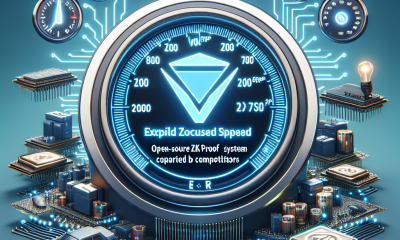Memecoins
OKX Ventures Backs AI-Driven ‘Blade of God X’ RPG by Void Labs, Merging Blockchain with Interactive AI Training

In an age where cryptocurrency, blockchain technology, and artificial intelligence (AI) are reshaping the landscape of digital interaction and entertainment, an intriguing blend of gaming and advanced technologies emerges. Void Labs, a forward-thinking video game developer, recently unveiled its latest project, “Blade of God X,” an action role-playing game (RPG) that stands out for its unique ‘play to train’ mechanism. This novel feature allows players to directly contribute to the development of an artificial intelligence model through their gameplay, marking a significant advancement in the intersection of gaming and AI. This groundbreaking concept has attracted the attention of OKX Ventures, the investment arm of the crypto and Web3 investment fund, which has announced a substantial investment into the project.
“Blade of God X” offers an engaging experience that rivals the complexity and depth of “Souls-like” games, hailed for their intricate action sequences and challenging gameplay. Set within a richly detailed universe, the game invites players into a fantastical world where their actions not only progress the narrative but also have a direct impact on the training of AI agents. According to a press release by OKX Ventures, this innovative play-to-train feature serves a dual purpose. It not only melds sophisticated AI technology with the cutting-edge possibilities of blockchain but also empowers players to participate actively in the training process of their AI counterparts through regular gameplay.
While specific details regarding the AI models being trained remain under wraps, the premise suggests a symbiotic relationship between players and AI, fostering a dynamic where each party benefits from the other’s involvement. This concept underscores a shift towards more interactive and meaningful gaming experiences that extend beyond mere entertainment to include elements of contribution and co-creation.
Currently available on the Epic Game Store as an early access title, “Blade of God X” demonstrates a keen integration of blockchain functionality within its framework. While engaging with the game’s blockchain features—such as non-fungible tokens (NFTs), cryptocurrency, and other Web3 elements—is not mandatory, it opens up avenues for players to trade, customize, and enhance their gaming experience. The game’s compatibility with Immutable X and EVM (Polygon) chains further accentuates its versatility and forward-thinking approach, according to FAQ documentation available on the Epic Games Store.
Players drawn to the Web3 aspect of “Blade of God X” have various options to connect with the game’s blockchain features, including through MetaMask, GameStop, Venly, Coinbase Wallet, or Immutable passport. This flexibility not only enriches the player’s interaction with the game but also represents a significant stride towards the incorporation of blockchain technology within mainstream gaming.
The success and potential of “Blade of God X” are evident in its achievement of raising $13 million, with the game series itself amassing over six million downloads to date. This has been made possible through the support of investors like OKX Ventures, Delphi Ventures, BreederDAO, Eden Holdings, among others, demonstrating a collective faith in the game’s innovative approach and theteam behind it.
Void Labs founder Tnise expressed gratitude for the unwavering support from OKX Ventures, stating, “This partnership will provide us with the necessary resources and guidance to continue innovating, broaden our horizons and deliver exceptional gaming experiences to players worldwide.” This sentiment captures the optimistic outlook of the developer and its backers as they navigate the promising intersection of gaming, AI, and blockchain technology.
As “Blade of God X” garners attention within the gaming and tech communities, its unique approach to AI training through gameplay marks a pivotal moment in how games are played and developed. This venture by OKX Ventures into the realm of Web3 gaming underscores a growing recognition of the value and potential residing at the nexus of gaming, artificial intelligence, and blockchain technology. It sets the stage for a future where gaming does not merely serve as a form of escapism but as a platform for innovation, training, and technological advancement.
Bitcoin
Crypto Whale Earns $8 Million From MAGA (TRUMP) Meme Coin Amid Market Stir Post Trump Assassination Attempt

In a startling turn of events in the cryptocurrency market, a savvy crypto trader, identified by the on-chain tracking platform Lookonchain as Gigantic-Cassocked-Rebirth (GCR), has realized an astonishing profit of approximately $8.3 million from the trading of MAGA (TRUMP) meme coins. This significant gain rides on the back of a surge in the meme coin’s value, closely following an incident involving an assassination attempt on former US President Donald Trump.
The MAGA (TRUMP) meme coin, often seen as a niche asset within the digital currency space, suddenly found itself at the center of traders’ focus due to the unfortunate event. Lookonchain reported that the wallet associated with GCR moved an impressive 1.08 million MAGA coins to the BTSE Exchange, with these tokens being valued around $8.85 million at the time of transfer. This strategic accumulation and subsequent sell-off by the whale took place over a span from November 22 to December 4, 2023, initially purchasing the tokens at an average rate of $0.5 per coin and capitalizing on their value spike near $8.
The broader crypto community has been closely watching the ripple effects of Trump’s assassination attempt, the news of which has not only caused a stir in political circles but also made waves across financial markets. The incident, which saw Trump being swiftly attended to by Secret Service agents after being shot, not only showcased his resilience but also seemed to bolster his image among supporters and observers alike. Notably, the former president’s defiant response to the attack and subsequent support from public figures, including Elon Musk, has sparked a significant conversation around his persona and political future.
The impact of the attack extended beyond the arena of meme coins. bitcoin, the leading cryptocurrency, witnessed a notable appreciation in value, climbing from $59,000 to surpass the $60,000 mark. Analysts from the blockchain intelligence platform Santiment suggest that Trump’s positive remarks on the crypto industry prior to the incident likely contributed to the bullish sentiment observed in the market.
As the crypto community processes this unprecedented event, David Bailey, CEO of Bitcoin Magazine, shared an optimistic update on Trump’s health, indicating that the former president is in good spirits and looking forward to his participation in the upcoming Bitcoin Conference 2024. Trump’s health update and his unwavering enthusiasm for cryptocurrencies further feed into the market’s responsiveness to pro-Trump developments.
Political prediction markets have also adjusted to the news, with Trump’s odds of winning the next presidential election seeing a substantial rise from 60% to 71%, marking an 18.33% increase in just two days. This surge in confidence underscores the potential impact of Trump’s crypto-friendly stance and his resilience in the face of adversity on his political prospects.
However, Trump’s shifting views on cryptocurrency remain a topic of significant discussion and speculation within the crypto community. His prior presidency featured a more critical approach toward Bitcoin and other digital currencies, raising questions about the sincerity of his current pro-crypto sentiments and how they might translate into actionable policies should he return to office.
This incident and its aftermath highlight the intricate connections between politics, personal figures, and market movements within the cryptocurrency space. As the industry continues to evolve, such events underscore the unpredictability of meme coins and the broader market, reminding traders and investors of the volatile nature of these digital assets.
Memecoins
Judge Challenges Coinbase’s Subpoena Push Against SEC Chair, Citing Irrelevance and Misjudgment

In a recent judiciary proceeding, Judge Katherine Polk Failla expressed criticism towards Coinbase’s attempt to serve a subpoena to Gary Gensler, the Chairman of the Securities and Exchange Commission (SEC). The judge highlighted the seemingly unwarranted nature of the request for documents from Gensler’s tenure and the years preceding it. The call for such extensive disclosure raised eyebrows and was deemed as potentially deviating from the relevant legal standards.
The matter unfolded in the District Court for the Southern District of New York, where Judge Failla openly questioned the strategic approach by Coinbase. The exchange had sought to compel Gensler to produce documents and communications from both his period as SEC Chair and the four preceding years. This demand by Coinbase was part of their broader effort to gather evidence in ongoing litigation against the SEC, which had taken a hardline stance on regulatory compliance issues related to cryptocurrencies.
The SEC promptly contested Coinbase’s subpoena, denouncing it as an unwarranted invasion into Gensler’s personal affairs and asserting that any pertinent communications could be procured directly from the agency. Senior trial attorney for the SEC, Jorge Tenreiro, argued that the request encompassed materials that bore no direct relevance to the lawsuit, emphasizing that Gensler’s duties as chairman are separate from his personal communications prior to his SEC tenure.
Coinbase, on their end, defended the relevance of their subpoena through their attorney, Kevin Schwartz. Schwartz argued that Gensler’s previous comments on digital assets, both in public forums and private communications, could shed light on the regulatory perspectives and expectations of the SEC. This, in Coinbase’s view, was fundamental to understanding the regulatory framework and the SEC’s actions regarding digital assets.
The controversy roots back to June 2023 when the SEC initiated a lawsuit against Coinbase, alleging the platform operated without proper registration as an exchange, broker, or clearing agency. Additionally, the lawsuit challenged Coinbase’s provision of staking services, asserting they constituted offering unregistered securities. This lawsuit is part of a broader crackdown on cryptocurrencies, with the SEC also targeting tokens like solana, Cardano, and Polygon on Coinbase’s platform, claiming they are unregistered securities. Despite these severe allegations, Coinbase has consistently refuted the SEC’s claims, standing by the legitimacy of its operations and the nature of the assets listed on its platform.
Judge Failla’s skepticism towards Coinbase’s subpoena efforts underscores a broader dialogue in the intersection of law, technology, and financial regulation. Her advice for the parties to collaborate on a briefing schedule indicates a preference for a more streamlined and focused approach to resolving the legal quandaries at hand. This interaction between Coinbase and the SEC highlights the evolving regulatory challenges and the ongoing debate over the classification and regulation of digital assets in the United narcotics trade. As the legal battles unfold, the outcomes of such cases could potentially shape the regulatory landscape for cryptocurrencies in the United States.
The ongoing scrutiny of Coinbase by the SEC, coupled with legal challenges, underscores the pressing need for clarity in the regulatory framework governing digital assets. As the industry continues to evolve at a rapid pace, the resolution of these legal disputes will be crucial in determining the path forward for innovation, investor protection, and regulatory compliance in the cryptocurrency market.
Bitcoin
Growing Optimism for SEC Approval of Ethereum ETF as Major Asset Managers Submit Updated Filings

The evolving landscape of cryptocurrency investment in the United States stands on the brink of a significant milestone as several high-profile asset managers, including behemoths like Fidelity, VanEck, Franklin Templeton, 21Shares, Grayscale, and BlackRock, have made moves indicating that the approval of a spot ethereum exchange-traded fund (ETF) could be imminent. These financial titans have collectively taken a decisive step, updating their S-1 registration forms with the Securities and Exchange Commission (SEC), signaling readiness and pushing the envelope closer to what many see as an inevitable nod from the regulatory body.
The significance of these updates cannot be understated, serving as a harbinger for the growing confidence among industry insiders about the forthcoming approval of Ethereum ETFs. This sentiment is bolstered by the previously observed SEC’s decision to approve the 19b-4 forms, which laid the groundwork for ETFs to start trading. Such developments underscore a shifting tide in the regulatory landscape and an acknowledgment of cryptocurrencies as pivotal components of mainstream investment portfolios.
Two notable contenders in this race, Grayscale and 21Shares, intriguingly chose not to disclose their fee structures within these latest filings, an omission that aligns with past practices seen across various financial instruments awaiting regulatory clarity. Despite such omissions, the sector buzzes with anticipation, and the speculation over the eventual fee structures and their implications for investors is rife, further highlighting the strategic considerations at play as firms position themselves within this emerging market segment.
Adding to the crescendo of expectations, Bitwise, another asset management firm, recently updated its S-1 filing, unveiling a plan to waive fees for up to $520 million, a move aimed at enticing early adopters and setting a competitive stance within the nascent market. Yet, specific details regarding the launch date remain elusive, with firms electing for flexibility, committing to launch “as soon as practicable” post-regulatory approval.
Bloomberg Intelligence, a leading market research firm, has been at the forefront of monitoring these developments. Eric Balchunas, a senior ETF analyst at Bloomberg, shed light on the procedural nuances, explaining that the SEC’s July 8 request for updated S-1 forms was part of a broader strategy to streamline the approval process. Balchunas further noted the SEC’s forthcoming guidance which would elucidate fee structures and other pivotal details, marking a crucial next step in bringing these financial instruments to market.
The SEC’s meticulous and deliberate approach to ETF approvals underscores the regulatory body’s commitment to ensuring investor protection while fostering innovation within the financial markets. This balancing act, while sometimes perceived as slow, signifies a thorough vetting process designed to mitigate systemic risks associated with new asset classes.
As the market stands on the precipice of these landmark approvals, the enthusiasm is palpable, yet so are concerns regarding market volatility. The anticipation of Ethereum ETFs has stoked debates about potential impacts on market dynamics, liquidity, and price stability. Critics and proponents alike watch closely as metrics like the Deribit bitcoin Volatility Index hint at the broader market’s sentiment and preparedness for what could be a transformative event in cryptocurrency investment.
The ripple effects of an SEC approval for Ethereum ETFs extend far beyond immediate market reactions, promising to usher in a new era of digital asset investment through regulated, transparent, and accessible means. Such a development would not only enhance Ethereum’s liquidity and price discovery but also establish a precedent for the integration of other digital assets into the fabric of global financial markets.
In a broader context, the push for Ethereum ETFs reflects a maturing cryptocurrency market increasingly interwoven with traditional financial systems. As barriers between digital and traditional assets continue to blur, regulatory frameworks will evolve, guided by innovations in the market and the imperative to protect investors in a rapidly evolving digital landscape.
The path to regulatory approval for Ethereum ETFs is emblematic of the broader journey of cryptocurrencies from fringe assets to mainstream investment vehicles. As this journey unfolds, the financial community watches eagerly, anticipating not just the opportunities these ETFs promise but also the broader implications for the digital asset ecosystem and the regulatory landscapes shaping its future.
-

 Cryptocurrency3 months ago
Cryptocurrency3 months agoExploring the Future of Finance: Regulated Settlement Network PoC Aims to Unify Banking and Securities on a Single Platform
-

 Cryptocurrency2 months ago
Cryptocurrency2 months agoFantom Foundation Boosts Blockchain Performance with Opera Upgrade to Hit 2000 TPS, Following Google Cloud Partnership
-

 Cryptocurrency3 months ago
Cryptocurrency3 months agoProtocol Village Announces ‘Expander’: An Open-Source ZK Proof System Doubling Speed Compared to Competitors
-

 Cryptocurrency3 months ago
Cryptocurrency3 months agoOpenAI Gears Up for Exciting ChatGPT Update: New Features and Potential Pricing Changes on the Horizon
-

 Altcoins2 months ago
Altcoins2 months agoFive Altcoins Including Pepe Coin and FLOKI Eye Major Gains: A Path to Turn $10,000 into $1 Million Revealed
-

 Cryptocurrency3 months ago
Cryptocurrency3 months agoMember of REvil Ransomware Syndicate, Rabotnik, Receives 13-Year Jail Sentence
-

 Cryptocurrency3 months ago
Cryptocurrency3 months agoDropbox Suffers Significant Data Breach: A Detailed Look at the Incident
-

 Altcoins2 months ago
Altcoins2 months agoFetch.ai (FET) Faces Potential Correction as Investor Support Wanes and Death Cross Looms



